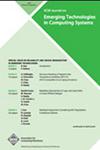Introduction to the Special Issue on CAD for Security: Pre-silicon Security Sign-off Solutions Through Design Cycle
IF 2.6
4区 计算机科学
Q3 COMPUTER SCIENCE, HARDWARE & ARCHITECTURE
引用次数: 0
Abstract
This introduction welcomes all readers to this ACM JETC special issue on CAD for Security: Pre-silicon Security Sign-off Solutions Through Design Cycle. The articles published in this special issue reflect how computer-aided design (CAD) tools are developed to expand the notion of automated security verification throughout the system-on-chip (SoC) design cycle. This special issue aims to demonstrate how the semiconductor industry must look for security-oriented metrics and evaluation as part of automatic CAD solution development to aid analysis, identifying, root-causing, and mitigating SoC security problems. Throughout this introductory note, we first represent the need for such a security-oriented sign-off solution for the ASIC design flow, then it is followed by providing an overview of the articles published in this special issue and how they address such requirements.安全CAD特刊简介:设计周期中的预硅安全签字解决方案
本简介欢迎所有读者阅读ACM JETC关于CAD for Security的特刊:通过设计周期的硅前安全签字解决方案。本期特刊中发表的文章反映了计算机辅助设计(CAD)工具是如何开发的,以在整个片上系统(SoC)设计周期中扩展自动安全验证的概念。本特刊旨在展示半导体行业必须如何寻找面向安全的指标和评估,作为自动CAD解决方案开发的一部分,以帮助分析、识别、根本原因和缓解SoC安全问题。在本介绍性说明中,我们首先阐述了ASIC设计流程对这种面向安全的签字解决方案的需求,然后概述了本特刊中发表的文章以及它们如何满足这些要求。
本文章由计算机程序翻译,如有差异,请以英文原文为准。
求助全文
约1分钟内获得全文
求助全文
来源期刊
CiteScore
4.80
自引率
4.50%
发文量
86
审稿时长
3 months
期刊介绍:
The Journal of Emerging Technologies in Computing Systems invites submissions of original technical papers describing research and development in emerging technologies in computing systems. Major economic and technical challenges are expected to impede the continued scaling of semiconductor devices. This has resulted in the search for alternate mechanical, biological/biochemical, nanoscale electronic, asynchronous and quantum computing and sensor technologies. As the underlying nanotechnologies continue to evolve in the labs of chemists, physicists, and biologists, it has become imperative for computer scientists and engineers to translate the potential of the basic building blocks (analogous to the transistor) emerging from these labs into information systems. Their design will face multiple challenges ranging from the inherent (un)reliability due to the self-assembly nature of the fabrication processes for nanotechnologies, from the complexity due to the sheer volume of nanodevices that will have to be integrated for complex functionality, and from the need to integrate these new nanotechnologies with silicon devices in the same system.
The journal provides comprehensive coverage of innovative work in the specification, design analysis, simulation, verification, testing, and evaluation of computing systems constructed out of emerging technologies and advanced semiconductors

 求助内容:
求助内容: 应助结果提醒方式:
应助结果提醒方式:


